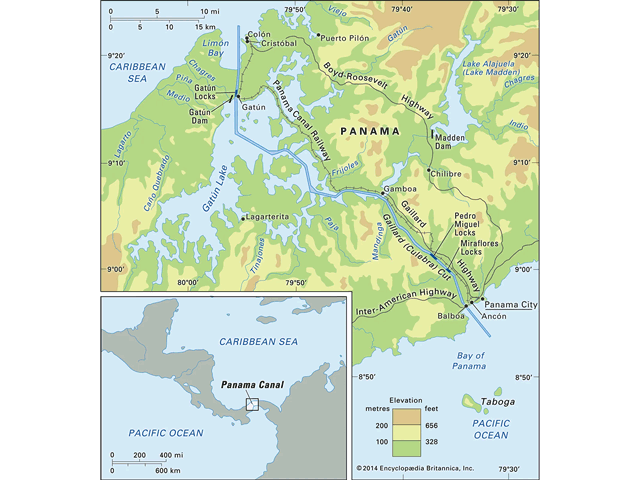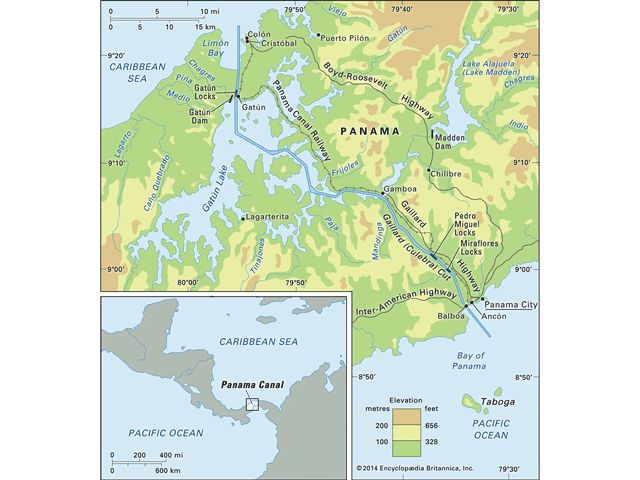Market Matters Blog
No Relief in Panama Canal Water Levels Is Disrupting Grain Shipments
The Panama Canal is experiencing an unprecedented drought that started this past summer and is continuing to hamper vessel traffic and either slowing or stalling ships needing to pass through. Some have even diverted their shipments because of the long wait.
The Panama Canal relies on an artificial lake, Gatun Lake, which is 85 feet above sea level, and fills the locks in the Panama Canal with fresh water needed to raise vessels as they pass from the Pacific Ocean to the Atlantic Ocean. As of Dec. 10, the lake was at 81.6 feet, below the 85 feet needed to reach the level of Gatun Lake, according to the Panama Canal Authority (ACP) website.
"We need to keep in mind that the 'rainy season' in Panama is just ending. So, this low water situation in Panama will last a bit longer than hoped," Jay O'Neil, HJ O'Neil Commodity Consulting told DTN.
"For the next few months, there is no Panama Canal for grain shipments from the U.S. Gulf to Asia. This will also severely impact grain shipments from the U.S. Gulf to West Coast Central America and from PNW to East Coast Central America," said O'Neil. "It is rather easy to assume that PNW exports will take some business away from the Gulf. How much is not yet clear. Already seeing some Central and South American customers asking for PNW quotes. Others are currently paying the extra freight to go via the Straights of Magellan and Asian customers routing via the Suez Canal."
On Nov. 26, O'Neil told DTN, "If a Panamax or Supramax, or other, grain ship loads the U.S. Gulf in the next three months, and wants to travel to Asia, they will need to contact the Panama Canal Authority and book a 'for fee' booking slot for a specific day in the future. And that possibility greatly depends on if a booking slot is available. If no booking slot is immediately available, the vessel must wait and keep trying, for it cannot transit through the canal unless it is lucky enough to obtain a booking slot or win a $2 million to $4 million-plus slot in the daily auction. And, as the booking slots are further reduced in the coming months, the auction bids will get larger."
O'Neil added, "Wait times for dry bulk grain shipments, vessels that cannot get a convenient booking slot, and cannot afford the auction, have run up to 20 days. November was easier, but December forward will be very difficult, especially for grain ships. Plus, there is a preferred customer list that gives priority to the booking slots and, unless you are one of the top five to 10 customers of the canal, you are sitting at the back of the request line. If you are more than 10 numbers down the preferred list, your chances are extremely slim. Best find another route to take."
In an Advisory to Shipping notice on Dec. 1 about auction slots, ACP said that, as of Dec. 3, "This special auction will be available to Neopanamax full container vessels that have already arrived at Canal waters and do not have a booking slot. The specific conditions that interested vessels must meet to participate in this auction will be announced three days before the transit date. The auction will be held two days before the transit date, and the initial bid for this auction will be $93,500."
P[L1] D[0x0] M[300x250] OOP[F] ADUNIT[] T[]
The ACP confirmed the reports of a record $4 million price paid by an LPG (liquefied petroleum gas) carrier for a slot offered in the November auction.
The ACP reservation slots from now until February are limiting transits to 22 in December, 20 in January and 18 in February. "The Panama Canal urges its customers to make reservations to transit as programmed. In addition, information is provided in advance, as well as in real-time, so that shipping companies can plan and make the best decisions."
O'Neil added, "There is now an auction for both the original and Neo-locks. A vessel without a booking slot at the original locks can participate in the daily auction and see what happens. Any non-prescheduled vessel that arrives at the Panama Canal must compete for a booking slot or take its chances in the expensive daily auction. Or just reroute."
Everyone continues to wrestle with the low water situation at the Panama Canal, and dry bulk vessel transits have dropped by about 60% in the last two months. "Since we are now entering the dry season in Panama, things do not have the potential to improve much until April or May," said O'Neil.
"Ocean freight costs will continue to increase along with the cost of fuel burned by ships waiting in line and any costs associated with diverting routes and/or late arrival of contracted goods."
Daily Gatun Water Level Indicators:
https://evtms-rpts.pancanal.com/…
Panama Canal lock system: Daily Gatun Water Level Indicators:
https://evtms-rpts.pancanal.com/…
Panama Canal Auction Notice Dec. 1: https://pancanal.com/…
Panama Canal Monthly Canal Operations Report Dec. 7: https://pancanal.com/…
Guide to various ship sizes: https://www.marineinsight.com/…
DTN Nov. 6 Panama Canal Story: https://www.dtnpf.com/…
Mary Kennedy can be reached at mary.kennedy@dtn.com.
Follow her on X, formerly known as Twitter, @MaryCKenn.
(c) Copyright 2023 DTN, LLC. All rights reserved.






Comments
To comment, please Log In or Join our Community .